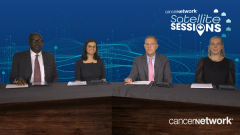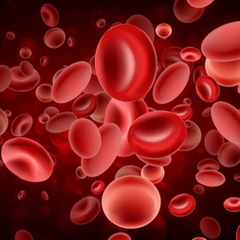
Assessing Frailty in Multiple Myeloma
Expert perspectives on assessing frailty for patients with multiple myeloma and its effect on treatment decisions.
Episodes in this series

Transcript:
Peter Voorhees, MD: We’ve talked a lot about frailty and transplant eligibility. [Dr Friend], do you want to talk a little bit about how you define frailty, and how in general we assess frailty at Levine Cancer Institute [LCI]?
Reed Friend, MD: I think it’s a really important question because maybe 10 years ago, we didn’t really assess frailty that well. I think it’s something important to consider. Age is just a number in my mind. We have the IMWG [International Myeloma Working Group] frailty score. That’s something that’s available online. You can input the data for your patient. It includes the chronological age, cognitive and physical abilities, so it includes their ADLs [activities of daily living] and IADLs [instrumental activities of daily living], and then their own comorbidities, including things like concurrent cancers, or HIV, renal disease, that sort of thing. It gives you a number of 0 to 5 and then categorizes someone as fit, intermediate fit, or frail. At LCI, we also have a wonderful supportive oncology service that offers geriatric assessment, which is very helpful. Included in the geriatric assessment, they also do the Get Up and Go Test, which is very predictive of how patients will do with treatment. They’ll also calculate a [chemotherapy] toxicity scale, which is all important to consider when you have someone who you’re considering more frail.
Peter Voorhees, MD: I would completely agree with that. Speaking of frailty, there was an interesting publication, which was a subset analysis from the [phase 3] MAIA trial [NCT02252172] looking at len-dex [lenalidomide-dexamethasone] with or without daratumumab. They specifically looked at patients who were deemed frail based on the International Myeloma Working Group definition of frailty. They looked at those patients who were fit, intermediate fit, and frail. Interestingly, what they found was that the 3-drug [regimen] performed better than the 2-drug [regimen], even in the frail patients, and it also outperformed with regard to [progression-free survival] for those with intermediate-fit features as well as those patients who were fit. With that in mind, is there any scenario where you guys would use a 2-drug regimen in a newly diagnosed myeloma patient in this day and age?
Kwabena Osei-Boateng, MD: No, unless there are comorbidities that would preclude using, which with dara, there aren’t a whole lot of them.
Amy Soni, MD: Yeah, maybe you just do dara and dex or something. I don’t know. I haven’t done it personally, but if you’re even nervous about Revlimid [lenalidomide], and you really just wanted to give them some sort of symptomatic relief.
Peter Voorhees, MD: What I’m hearing is that in extreme circumstances, perhaps the very [elderly], the patient well into their 90s or someone who’s really saddled with a number of comorbidities, where you may even be talking about goals of care right from the get-go, that would be the person where you would deescalate. But given the tolerability of the monoclonal antibodies, a lot of these patients will be getting a 3-drug therapy from the get-go. Then going back to that kind of assessment of frailty, how does that impact how you dose patients?
Reed Friend, MD: I still like the start low and go slow because especially more so with Revlimid, sometimes they do have a harder time tolerating the higher doses. If you start low and you see they’re tolerating it well, you can dose escalate on subsequent cycles. Definitely starting low on the dexamethasone because we know all the adverse effects that can come with that.
Peter Voorhees, MD: I would completely agree with that.
Transcript is AI-generated and edited for clarity and readability.
Newsletter
Stay up to date on recent advances in the multidisciplinary approach to cancer.






































